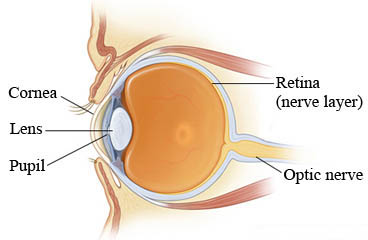
What do your eyes do?
You see with your eyes.
In a healthy eye, light goes through the pupil. Then your lens focuses the light on the retina at the back of the eye. The retina changes the light into electrical signals that go to the brain. The brain turns these into images.
What problems can happen to your eyes?
Problems with your eyes may include:
- Infections. These include pinkeye, a stye, or blepharitis.
- Pinkeye is redness and swelling of the lining of the eyelid and the surface of the eye. A gray or yellow fluid may ooze from the eye.
- A stye is an infection in the tiny oil glands along the edge of the eyelid. Your eyelid may be swollen or tender. And you may have a tender lump on it. Fluid may drain from this lump.
- Blepharitis is swelling or infection of the eyelid. The edge of your eyelid may be itchy, red, and irritated. You may also have sores on your eyelid. Your eye may burn or itch.
- Eye injuries, such as a chemical or object in your eye.
Long-term eye problems may include:
- Cataracts. This is a painless, cloudy area in the lens of the eye. It blocks light from the retina and may cause vision problems.
- Nearsightedness. This means it is hard to see things far from you.
- Farsightedness. This means it is hard to see things close to you.
- Macular degeneration. This is the loss of your central vision.
- Glaucoma. This causes you to lose your vision, especially your side vision. It can lead to blindness.
- Diabetic retinopathy. This can damage the retina and make your vision worse over time.
How can you prevent eye problems?
- Don't rub your eyes. Rubbing can irritate them. It can also move bacteria into your eyes and cause infections. If you need to touch your eyes, wash your hands first.
- Protect your eyes from dust and air pollution. For example, wear safety glasses when you rake or mow the lawn.
- If you have diabetes, keep your blood sugar under control.
- Wear goggles or protective glasses when you work with power tools or chemicals or when you hammer nails.
- Wear goggles or protective glasses when you play sports that can be dangerous for your eyes. These include racquetball and hockey.
- When you are in the sun, wear sunglasses that block UV rays and hats with big brims. When you use a tanning lamp or tanning booth, protect your eyes.
- Get regular vision checkups:
- Every 2 years if you wear glasses.
- Every 5 years if you don't wear glasses.
- As your doctor recommends, if you have diabetes, a family history of eye problems, or a vision problem such as glaucoma, cataracts, or macular degeneration.
- As your doctor recommends, if you take medicines that may affect the eyes. These include any medicine that you put in your eyes, medicines (called blood thinners) that prevent blood clots, and medicines for bladder control problems.
Where can you learn more?
Go to http://www.healthwise.net/patientEd
Enter W493 in the search box to learn more about "Learning About Your Eyes".
Current as of: October 27, 2024
Author: Ignite Healthwise, LLC Staff
Clinical Review Board
All Ignite Healthwise, LLC education is reviewed by a team that includes physicians, nurses, advanced practitioners, registered dieticians, and other healthcare professionals.

